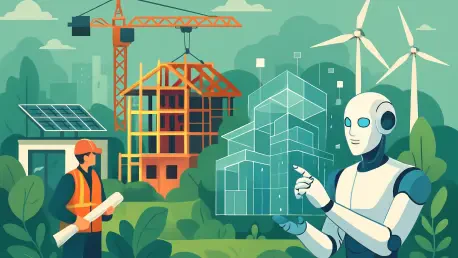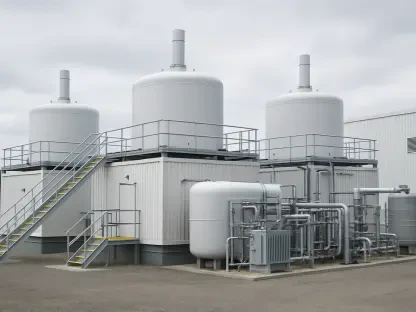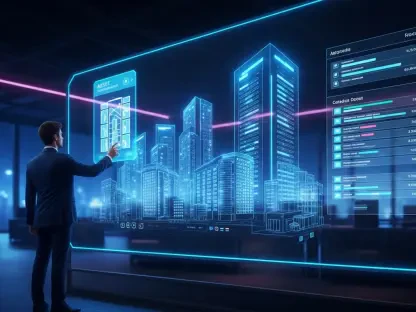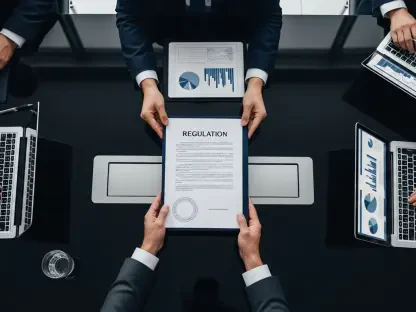Artificial intelligence (AI) stands poised to revolutionize sustainable construction, offering solutions that could significantly alter industry practices for the better. As environmental concerns take precedence in global policy discussions, the construction sector remains under immense pressure to transform its methods, reducing the ecological footprint while retaining efficiency and innovativeness. AI is becoming a prominent tool in this transformation, providing innovative ways to tackle logistical challenges, optimize processes, and make strategic decisions that consider sustainability at their core. The 2025 Verdantix Green Quadrant Report on construction management software shines a spotlight on these developments, highlighting AI’s critical role in addressing current constraints such as labor shortages, ineffective data management, and sustainability imperatives. As AI begins to intertwine more deeply with construction management systems, its potential to guide sustainable building practices grows, presenting a multifaceted challenge that the industry must navigate.
AI’s Role in Construction Management Systems
Verdantix’s report examines AI integration within construction management systems (CMS), emphasizing AI’s capacity to enhance data processing and operational efficiency. AI-driven tools within CMS can parse vast datasets quickly, offering insights and predictive analytics that aid in project planning and execution. With construction becoming increasingly data-intensive due to complex modeling and procurement processes, AI provides a means to streamline activities that traditionally bog down operations. By analyzing data trends and optimizing resource allocation, AI tools facilitate proactive problem-solving that aligns with sustainable practices. Companies incorporating these systems see improvements not only in efficiency but also in aligning corporate strategies with environmental goals. The Green Quadrant methodology utilized in evaluating these systems presents a graphical representation where momentum is mapped against capability, allowing businesses to visualize their strategic position and progress within sustainable benchmarks.
Moreover, AI-driven CMS solutions demonstrate substantial improvements in compliance management, field operations, and organizational resources. These advancements are highlighted in Verdantix’s recognition of leading companies such as RIB Software, noted for setting an industry standard. By effectively blending AI with CMS, companies are better equipped to manage sustainability metrics alongside business performance indicators, creating a comprehensive approach that supports long-term viability. This capability allows firms not only to meet current regulatory requirements but also to anticipate future sustainability challenges and opportunities, maintaining their competitive edge in evolving markets. With AI’s role in CMS growing, construction companies can expect a ramp-up in precision, speed, and adaptability as they aim for greater sustainability.
Transforming Data Governance and Supply Chains
A core aspect of transforming sustainable construction lies in dismantling data silos and enhancing data governance. The Verdantix report underscores the challenges posed by poor data management, linking ineffective decision-making processes to fragmented data systems. AI offers a solution by fostering integration and connectivity across various data points, ensuring seamless communication between project facets such as design modeling, procurement, and real-time monitoring. This integration reduces redundancy and enhances transparency, resulting in more informed and timely decisions that factor in sustainability objectives. Construction firms leveraging AI for data governance see marked improvements in project coordination, risk management, and overall environmental impact reduction.
Furthermore, the focus on sustainable supply chains complements these efforts by emphasizing social and environmental responsibility. Verdantix highlights the importance of selecting sustainable suppliers, noting that CMS providers should integrate green policies throughout their value chains. AI aids in evaluating supplier credentials, tracking material usage, and minimizing waste, thus promoting environmentally conscious procurement practices. As AI grows in influence, it enables a more holistic approach to sustainable construction, combining advanced analytics with ethical supply chain management principles. The result is a coherent and efficient strategy that supports both business and ecological imperatives, positioning construction firms as leaders in sustainable practice.
Achieving Sustainable Outcomes Through Digital Tools
Advanced digital tools integrated with AI are driving the push toward sustainable construction outcomes. These technologies are instrumental in reaching green building certifications, such as LEED and BREEAM, recognized globally for their rigorous standards. AI tools enhance detailed specification management, material tracking, and reporting, all crucial for obtaining such esteemed certifications. By simulating energy and material efficiency scenarios using 6D building information modeling and carbon accounting software, firms can accurately predict and optimize their projects’ sustainability impacts. In addition, AI-enabled digital planning resources streamline construction workflows, employing strategies like modular construction to minimize waste and resource consumption.
AI’s capacity to innovate within the digital construction landscape extends beyond compliance, pushing the boundaries of what is possible in sustainable practice. These technologies empower architects and builders to embrace environmental stewardship without sacrificing quality or efficiency. As Verdantix notes, the integration of AI with CMS represents a significant growth potential in marrying technological advancements with ecological objectives. Now more than ever, construction firms must consider AI not just as a tool for enhancing operational efficiency but as a cornerstone for sustainable progress, ensuring their practices align with broader efforts toward a greener future.
Navigating Toward a Sustainable Future
Artificial intelligence (AI) is set to transform sustainable construction, offering promising solutions that could positively alter industry practices. With environmental concerns at the forefront of global policy discussions, the construction sector is under intense pressure to innovate its methods, aiming to decrease its ecological footprint while maintaining efficiency and creativity. AI emerges as a key tool in this transformative process, providing novel methods to address logistical dilemmas, streamline operations, and make strategic choices that prioritize sustainability. The 2025 Verdantix Green Quadrant Report on construction management software underscores these trends, highlighting AI’s pivotal role in overcoming current challenges such as labor shortages, inefficient data usage, and sustainability demands. As AI increasingly integrates into construction management systems, its potential to steer sustainable building methods expands, offering a complex challenge that the industry must skillfully manage to advance toward a more sustainable future.









